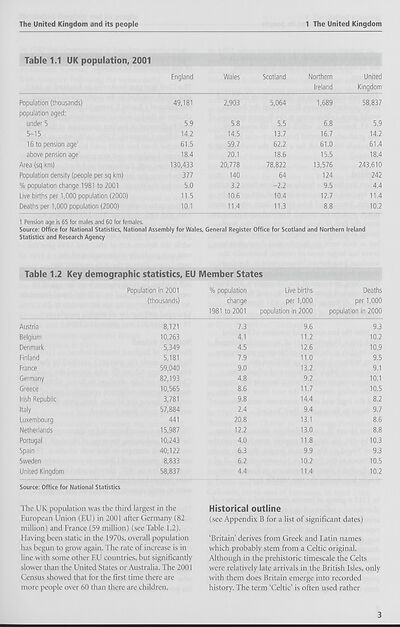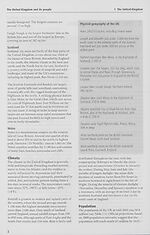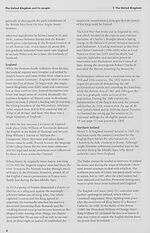Download files
Complete book:
Individual page:
Thumbnail gallery: Grid view | List view

The United Kingdom and its people
1 The United Kingdom
Table 1.1 UK population, 2001
England
Wales
Scotland
Northern
Ireland
United
Kingdom
Population (thousands)
population aged:
under 5
5-15
16 to pension age1
above pension age!
Area (sq km)
Population density (people per sq km)
% population change 1981 to 2001
Live births per 1,000 population (2000)
Deaths per 1,000 population (2000)
49,181
5.9
14.2
61.5
18.4
130,433
377
5.0
11.5
10.1
2,903
5.8
14.5
59.7
20.1
20,778
140
3.2
10.6
11.4
5,064
5.5
13.7
62.2
18.6
78,822
64
-2.2
10.4
11.3
1,689
6.8
16.7
61.0
15.5
13,576
124
9.5
12.7
58,837
5.9
14.2
61.4
18.4
243,610
242
4.4
11.4
10.2
1 Pension age is 65 for males and 60 for females.
Source: Office for National Statistics, National Assembly for Wales, General Register Office for Scotland and Northern Ireland
Statistics and Research Agency
Table 1.2 Key demographic statistics, EU Member States
Population in 2001
(thousands)
% population
change
1981 to 2001
Live births
per 1,000
population in 2000
Deaths
per 1,000
population in 2000
Austria
Belgium
Denmark
Finland
France
Germany
Greece
Irish Republic
Italy
Luxembourg
Netherlands
Portugal
Spain
Sweden
United Kingdom
8,121
10,263
5,349
5,181
59,040
82,193
10,565
3,781
57,884
441
15,987
10,243
40,122
8,833
58,837
7.3
4.1
4.5
7.9
9.0
4.8
8.6
9.8
2.4
20.8
12.2
4.0
6.3
6.2
4.4
9.6
11.2
12.6
11.0
13.2
9.2
11.7
14.4
9.4
13.1
13.0
11.8
9.9
10.2
11.4
9.3
10.2
10.9
9.5
9.1
10.1
10.5
8.2
9.7
8.6
8.8
10.3
9.3
10.5
10.2
Source: Office for National Statistics
The UK population was the third largest in the
European Union (EU) in 2001 after Germany (82
million) and France (59 million) (see Table 1.2).
Having been static in the 1970s, overall population
has begun to grow again. The rate of increase is in
line with some other EU countries, but significantly
slower than the United States or Australia. The 2001
Census showed that for the first time there are
more people over 60 than there are children.
Historical outline
(see Appendix B for a list of significant dates)
‘Britain’ derives from Greek and Latin names
which probably stem from a Celtic original.
Although in the prehistoric timescale the Celts
were relatively late arrivals in the British Isles, only
with them does Britain emerge into recorded
history. The term ‘Celtic’ is often used rather
3
1 The United Kingdom
Table 1.1 UK population, 2001
England
Wales
Scotland
Northern
Ireland
United
Kingdom
Population (thousands)
population aged:
under 5
5-15
16 to pension age1
above pension age!
Area (sq km)
Population density (people per sq km)
% population change 1981 to 2001
Live births per 1,000 population (2000)
Deaths per 1,000 population (2000)
49,181
5.9
14.2
61.5
18.4
130,433
377
5.0
11.5
10.1
2,903
5.8
14.5
59.7
20.1
20,778
140
3.2
10.6
11.4
5,064
5.5
13.7
62.2
18.6
78,822
64
-2.2
10.4
11.3
1,689
6.8
16.7
61.0
15.5
13,576
124
9.5
12.7
58,837
5.9
14.2
61.4
18.4
243,610
242
4.4
11.4
10.2
1 Pension age is 65 for males and 60 for females.
Source: Office for National Statistics, National Assembly for Wales, General Register Office for Scotland and Northern Ireland
Statistics and Research Agency
Table 1.2 Key demographic statistics, EU Member States
Population in 2001
(thousands)
% population
change
1981 to 2001
Live births
per 1,000
population in 2000
Deaths
per 1,000
population in 2000
Austria
Belgium
Denmark
Finland
France
Germany
Greece
Irish Republic
Italy
Luxembourg
Netherlands
Portugal
Spain
Sweden
United Kingdom
8,121
10,263
5,349
5,181
59,040
82,193
10,565
3,781
57,884
441
15,987
10,243
40,122
8,833
58,837
7.3
4.1
4.5
7.9
9.0
4.8
8.6
9.8
2.4
20.8
12.2
4.0
6.3
6.2
4.4
9.6
11.2
12.6
11.0
13.2
9.2
11.7
14.4
9.4
13.1
13.0
11.8
9.9
10.2
11.4
9.3
10.2
10.9
9.5
9.1
10.1
10.5
8.2
9.7
8.6
8.8
10.3
9.3
10.5
10.2
Source: Office for National Statistics
The UK population was the third largest in the
European Union (EU) in 2001 after Germany (82
million) and France (59 million) (see Table 1.2).
Having been static in the 1970s, overall population
has begun to grow again. The rate of increase is in
line with some other EU countries, but significantly
slower than the United States or Australia. The 2001
Census showed that for the first time there are
more people over 60 than there are children.
Historical outline
(see Appendix B for a list of significant dates)
‘Britain’ derives from Greek and Latin names
which probably stem from a Celtic original.
Although in the prehistoric timescale the Celts
were relatively late arrivals in the British Isles, only
with them does Britain emerge into recorded
history. The term ‘Celtic’ is often used rather
3
Set display mode to:
![]() Universal Viewer |
Universal Viewer | ![]() Mirador |
Large image | Transcription
Mirador |
Large image | Transcription
The item on this page appears courtesy of Office for National Statistics and may be re-used under the Open Government Licence for Public Sector Information.
| Britain and UK handbooks > UK: The official yearbook of the United Kingdom of Great Britain and Northern Ireland > 2003 > (13) |
|---|
| Permanent URL | https://digital.nls.uk/204923264 |
|---|
| Attribution and copyright: |
|
|---|---|
| Description | Three volumes of 'UK: The official yearbook of the United Kingdom of Great Britain and Northern Ireland', published annually by the Office of National Statistics from 2002-2005. |
|---|---|
| Shelfmark | GII.11 SER |
| Description | Three titles produced by the British Government from 1954-2005 describing 'how Britain worked'. They are: 'Britain: An official handbook' (1954-1998), 'Britain: The official yearbook of the United Kingdom' (1999-2001), and 'UK: The official yearbook of the United Kingdom of Great Britain and Northern Ireland' (2002-2005). These 50 reports provide an overview of Britain's economic, social and cultural affairs, its environment, international relations, and the systems of government. They give an impartial summary of government policies and initiatives, and explain how public services are organised. |
|---|---|
| Additional NLS resources: |
|

